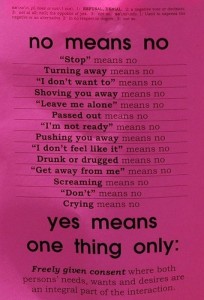By: Diane, Educator/Trainer
As a sexuality educator, I use the phrase “no means no” quite a bit when discussing consent for sexual activity. I frequently find myself frustrated at the reaction I get from young people on this topic. Some common responses include:
• “No doesn’t always mean no.”
• “She’s just playing hard-to-get and she wants me to try harder.”
• “She has to say no so that she doesn’t seem like a slut, but she really wants it.”
• “He let me do other things in bed, so he must want to go all the way.”
It often doesn’t occur to young people that their partners genuinely may not want to have sex, or that they might want to be sexual in some ways but not others. Many justify having sex with someone who has said “no” by convincing themselves that despite what they have said, their partner really does want it.
But why do so many people assume that no doesn’t necessarily mean no? Why do we so often convince ourselves that a victim of sexual violence somehow “asked for it” or provoked the assault? I believe much of the cause lies with the way we talk about and act out consent throughout our lives.
From childhood, we are taught that it is sometimes acceptable to touch others without their consent. Think of an elementary school playground: amid the happy chaos of children playing, two young boys begin scuffling. A teacher separates them, but takes no further action because “boys will be boys.” A whimpering girl reports that a boy has been teasing her and pulling her hair. Rather than reprimanding the boy, the teacher just winks at the girl and says, “That just means he likes you.”
As these examples indicate children often learn about consent as a flexible concept. If they are taught that they are entitled to keep pushing for what they want even if it violates another person’s comfort level, than why would we think this attitude wouldn’t be extended to sexual relationships?
On television and in the movies, we are inundated with images of men taking what they want rather than respecting the boundaries set by their love interests. Even when it rises to the level of physical violence, the encounter is still portrayed as a romantic ideal. When movies teach us that the guy always gets the girl if he just tries hard enough, how can we expect people to accept “no” as a final answer?
So how do we solve this problem? We begin to create a culture that values consent. There are many things we can be doing to work toward this goal; here are a few:
1. Start from the beginning.
We need to change the way we talk about consent from the very beginning. We need to teach our children that their bodies are their own and belong to no one else. No one should be allowed to touch them if they don’t want it, and if they are touching someone else they need to make sure the other person wants to be touched. (Check out this mom’s awesome letter to her sons for more guidance on having these conversations.)
2. Speak up!
Don’t be afraid to speak up when a potential partner is coming on too strong. If that person gets upset that you don’t want to be sexual, that’s their problem, not yours!
Step in to help if you see someone vulnerable to sexual assault because of drugs or alcohol. Intervene if one of your buddies is pressuring a girl or calling her a bitch for not wanting to be sexual with him.
3. Say “YES!” to sex you want!
The attitude that women should be ashamed of their sexual desires is dangerous. It teaches women that they should play hard-to-get before agreeing to have sex in order to avoid seeming promiscuous. Rachael Kay Albers put it well, “When we send the message that resistance is a form of flirtation . . . we romanticize the imposition of one human being’s will on another.” We should instead empower people to enthusiastically say “Yes!” when they want to have sex.
Set boundaries at your own comfort level, and be clear with your partner about what you want, but be sure to respect your partner’s boundaries as well.
4. Make consent sexy!
Instead of approaching consent as, “I’ll keep going until he/she stops me,” engage in active consent. Make consent a part of sexual interactions by allowing your partner to tell you what he or she wants you to do in bed. Communicating about what you want doesn’t have to be awkward or negative; consent can be sexy!
Phrases like “boys will be boys,” “she shouldn’t have been drinking/wearing a short skirt/hanging out with that crowd,” and “she was just playing hard-to-get,” reveal how screwed up our cultural views about consent have become. It’s time to change the message.
When we talk about consent, we need to talk about more than “no means no.” We need to get across the messages that our bodies belong only to ourselves; that there is absolutely nothing that entitles a person to violate your wishes; and that actively engaging in a process of consent can enhance sexual experiences.
What else do you think people can do to create a culture of consent? Leave your answer in the comments!

